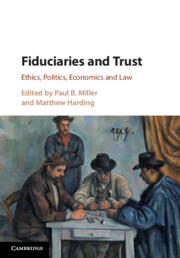Book contents
- Fiduciaries and Trust
- Fiduciaries and Trust
- Copyright page
- Dedication
- Contents
- Contributors
- Acknowledgements
- Introduction
- Part I Personal Trust and Fiduciary Relationships
- Part II Personal Trust and Fiduciary Duties
- Part III Political Trust and Fiduciary Government
- 9 Trust and Authority
- 10 The Fiduciary Crown
- 11 Political (Dis)Trust and Fiduciary Government
- 12 Trust, Distrust and the Rule of Law
- Part IV Trust and Fiduciary Law in Context
- Index
11 - Political (Dis)Trust and Fiduciary Government
from Part III - Political Trust and Fiduciary Government
Published online by Cambridge University Press: 13 March 2020
- Fiduciaries and Trust
- Fiduciaries and Trust
- Copyright page
- Dedication
- Contents
- Contributors
- Acknowledgements
- Introduction
- Part I Personal Trust and Fiduciary Relationships
- Part II Personal Trust and Fiduciary Duties
- Part III Political Trust and Fiduciary Government
- 9 Trust and Authority
- 10 The Fiduciary Crown
- 11 Political (Dis)Trust and Fiduciary Government
- 12 Trust, Distrust and the Rule of Law
- Part IV Trust and Fiduciary Law in Context
- Index
Summary
Political (Dis)Trust and Fiduciary Government analyzes the relationship between two key ideas in modern political thought: political trust and fiduciary government. The chapter begins with fiduciary government. Miller distinguishes ‘thick’ from ‘thin’ variants on the idea of fiduciary government. Thick variants place substantial normative weight on the idea, claiming, for example, that it solves the problem of political authority and provides an independent normative basis for the recognition of specific legal rights. Thin variants make much more modest claims. Miller’s own thin account, deployed here, suggests that fiduciary government articulates conditions under which the conduct of government can be understood as truly representative. By comparison with this thin conception of fiduciary government, an understanding of political trust as a particularized (or focused) and objective (or manifest) form of trust shown (or withheld) by citizens in public officials does distinct work. Briefly: it illuminates understanding of the political conditions and activity on which fiduciary government depends. That said, Miller also notes that ideals of fiduciary government and of political trust, where instantiated, dovetail: demands of fiduciary government enable public officials to prove trustworthy in ways that promote political trust, while also creating space for constructive forms of political distrust.
Keywords
- Type
- Chapter
- Information
- Fiduciaries and TrustEthics, Politics, Economics and Law, pp. 223 - 241Publisher: Cambridge University PressPrint publication year: 2020

